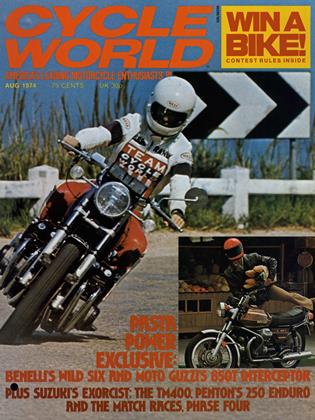UP FRONT
NO FAULT INSURANCE AND THE END OF AN ESTABLISHED MOTORCYCLE BAN
The U.S. Senate has passed a federal no-fault insurance bill containing an amendment giving state legislatures the option of excluding motorcycles from the coverage.
The passage of Senate Bill 354 follows more than two years of intensive campaigning by the American Motorcycle Association and the Motorcycle Industry Council to secure a motorcycle exclusion from no-fault. According to Gene Wirwahn, AMA legislative director, the fact that motorcycles have been excluded from no-fault in 19 of the 21 states thus far bodes well for the optional exclusion policy.
The Hart-Magnusson federal no-fault bill in its original form would have included motorcycles. However, in response to the urgings of the AMA, its concerned members, the Motorcycle Industry Council and its supporting dealers, Senator Edward F. Gurney (R-Fla.) agreed to sponsor an amendment to the bill that would allow the states considering no-fault to exclude vehicles with less than four wheels from the legislation and also to provide deductible coverage for motorcyclists if the state sees fit.
Wirwahn urged motorcyclists represented by supporters of the Gurney amendment to convey to these legislators their appreciation for their support. He specifically cited Senators Dole of Kansas, Church of Idaho, Scott of Pennsylvania, Tunney of California, Helms of North Carolina, Stevenson of Illinois, Bartlett of Oklahoma and Javits of New York, all of whom joined Gumey in sponsoring the exclusion amendment.
Wirwahn further noted that motorcyclists whose representatives in Washington voted against the amendment might wish to consider that fact when they go to the polls to weigh reelection of Senators Baker of Tennessee, Cook of Kentucky, Huddleston of Kentucky, Hughes of Iowa, Mansfield of Montana, McGee of Wyoming, Muskie of Maine, Nelson of Wisconsin, Randolph of West Virginia and Weicker of Connecticut.
Wirwahn notes that Gurney’s speed on behalf of the exclusion amendment includes large portions of the material that the AMA supplied to legislators considering the bill. He notes, “This is testimony to the fact that the AMA, with its large national membership, is being listened to in Washington. It is proof that the Congress and other segments of our federal government know who you are talking about when you say ‘American Motorcycle Association’.”
Gurney’s remarks included the following statement, “Motorcycles are becoming a much more valuable part of our economy. With fuel shortages and higher prices already facing the motorcyclist, he should at least be protected against the possibility of no-fault putting him off the road. We need the motorcyclists and we must assure them that they can remain part of the American scene.”
Wirwahn concluded, “Thanks to the efforts of Senator Gurney and the other sponsors of the exclusion amendment, as well as to all those senators who voted for the bill in its amended form, the threat of no-fault insurance pricing us off the road has been largely eliminated. The motorcyclists who wrote to their senators should feel proud that they played an important part in assuring that the motorcycle will continue to enjoy its rightful place on the nation’s highways.”
Equally noteworthy is the end of one long-standing, unyielding motorcycle ban. The New Jersey Senate has voted 21 to 8 in favor of a bill to allow motorcycle travel on the Garden State Parkway. Approval in the New JeuAi Assembly, which could come by mid-June, would purcm end to the New Jersey Highway Authority’s ban on bikes that dates back to 1961.
AMA Legislative Director Gene Wirwahn says, “The Parkway situation is a perfect example of what local motorcyclists can do to confront a local problem. New Jersey riders have worked long and hard to end the only motorcycle freeway ban in the world. Now their efforts are paying off.”
Wirwahn credits Jack Keating, former president of the Raritan Road Riders, for forming the “Committee for Cycles on the Parkway” and investing considerable time, energy and personal expense in the cause.
In addition, the Motorcycle Industry Council of New Jersey and its executive director, Cory S. Kammler have represented the dealer and industry interest in the fight to the utmost and have fully cooperated with Keating and with Mark Rosen, AMA district two congressman, who has lobbied intensively in the case since his election to that position.
Keating, Kammler, Rosen and Wirwahn all testified in support of the bill before the New Jersey State Transpo^^ tion Committee chaired by Senator John Horn, sponso^m the bill. A favorable recommendation by that committee over the objections of the New Jersey Highway Authority cleared the way for the Senate vote to end the ban.
During the Transportation Committee hearing, motorcycling representatives collided head-on with Major Daniel N. Kulund, M.D., whose recent attack on motorcycles in the pages of Parade Magazine was characterized by Wirwahn as “inaccurate and as noteworthy for its use of inflammatory rhetoric as for its lack of statistical backing.”
In describing the confrontation in New Jersey, Wirwahn says, “Dr. Kulund’s position seems completely contradictory. On the one hand he preaches ‘motorcycle safety’ and on the other testifies to keep motorcycles off one of the safest roadways in the country. I wonder about the seriousness and depth of his concern for human lives.”
Two breakthroughs in one month, the first step toward fair insurance costs and a precedent for obtaining equal rights on highways everywhere. There’s hope after all.
 View Full Issue
View Full Issue
More From This Issue
-
 Letters
LettersLetters
August 1974 -
 Departments
DepartmentsFeed Back
August 1974 -
 Departments
DepartmentsRound·up
August 1974 By Joe Parkhurst -
 Features
FeaturesNineteen Seventy Four Cycle World Show
August 1974 By Joe Parkhurst -
 Competition
CompetitionJohn Player Transatlantic Trophy 1974
August 1974 By D. Randy Riggs -
 Features
FeaturesPreparing the Penton
August 1974 By John Waaser




